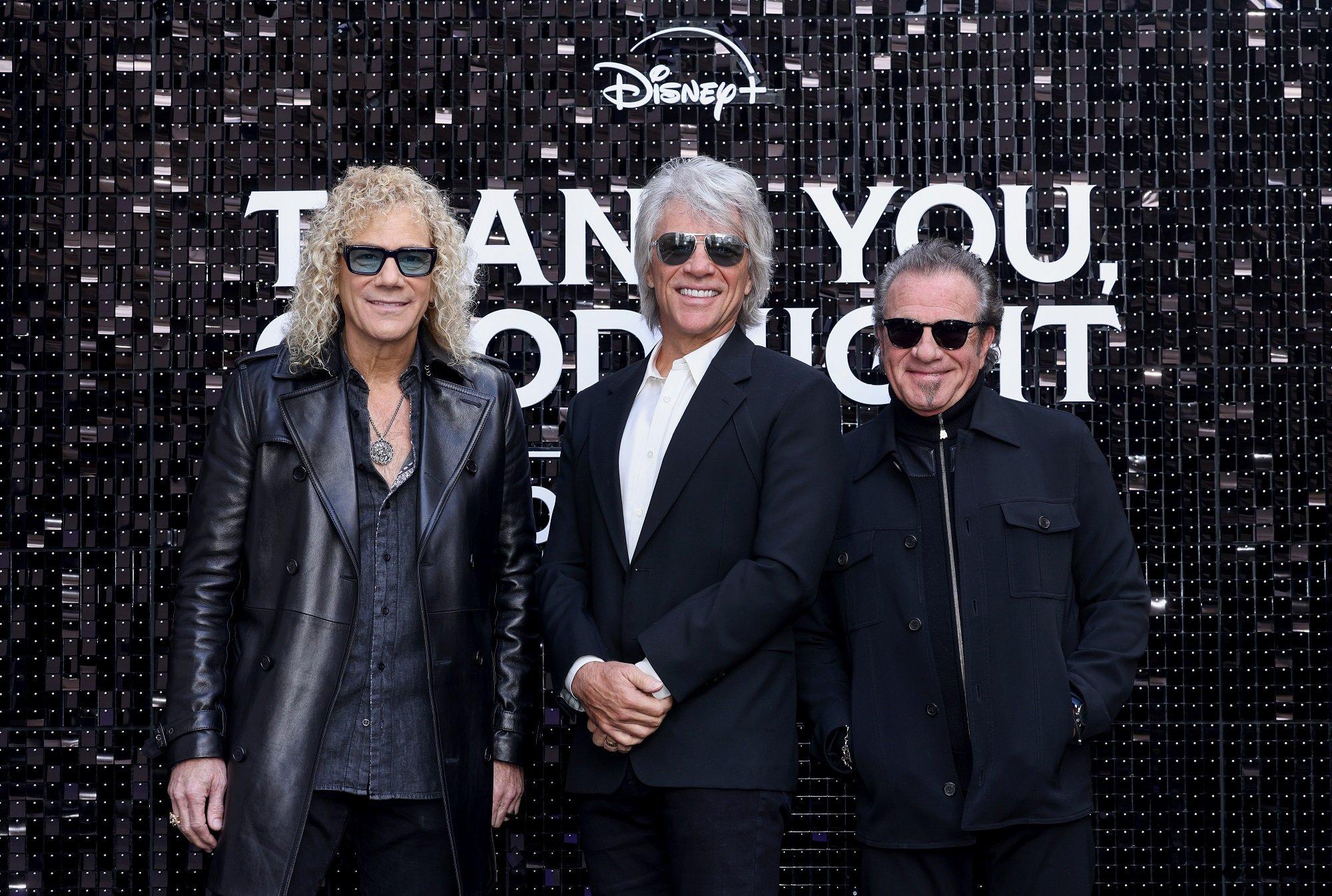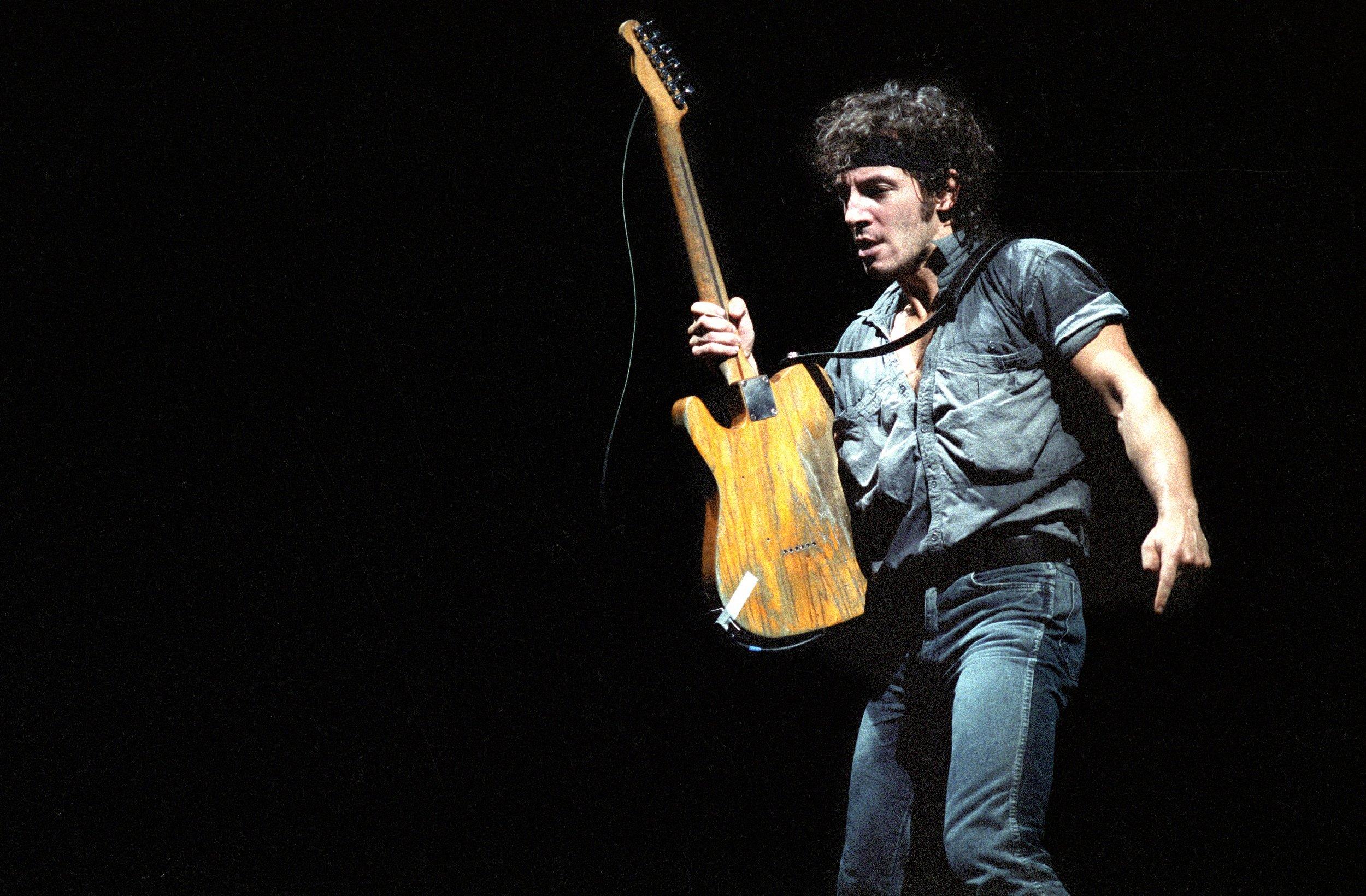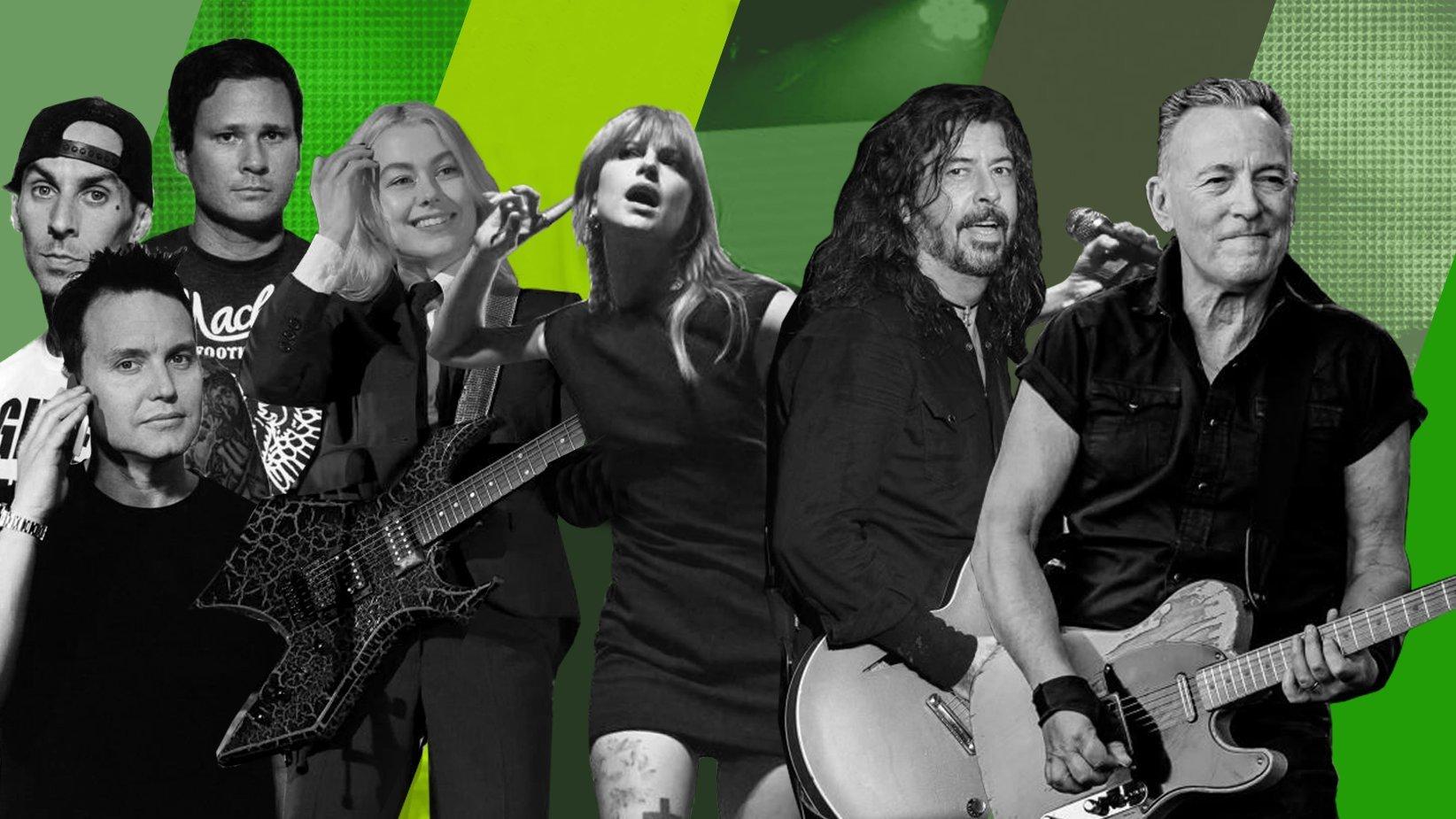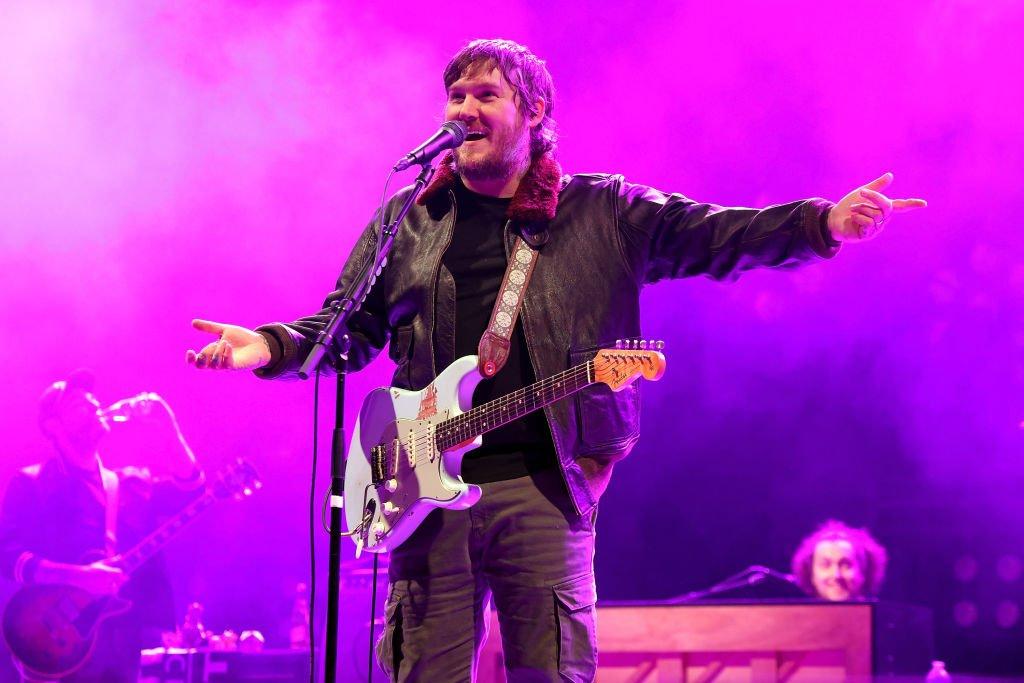(On Feb. 8 Bruce Springsteen was honored as the 2013 MusiCares Person of the Year at a star-studded gala in recognition of his exceptional artistic achievements and philanthropic work.The gala featured performances by Alabama Shakes, Faith Hill, Elton John, John Legend, and Sting, among others.)
Perhaps more than any other recording artist today, Bruce Springsteen celebrates the power and glory of the gospel of rock and roll. After more than 40 years of strapping on a guitar and fronting a band, Springsteen has reached a point in his career where he could rest on his laurels and few would blame him. Only he hasn't. And won't. Not now. Not tomorrow. Probably not ever.
Here's proof: Instead of slowing down, he's sped up. Instead of playing less, he's playing more. Instead of becoming soft and more forgiving, he's become hard and more pressing. Springsteen used to play three-hour-plus shows — with an intermission. Now he plays four hours — with no intermission.
Given a long, distinguished career that includes world tours, sold-out stadium shows, No. 1 albums, 20 GRAMMY Awards, a Rock and Roll Hall of Fame induction, and a Kennedy Center Honor, Springsteen could write safe and secure albums that cater to modern pop sensibilities and the charts. But Wrecking Ball, his latest effort, is a masterpiece of intensity and fury. It pokes a finger in the chest of our national leaders and demands answers as to why we've come to a place where the American dream is in jeopardy of losing its soul and promise.
Recently, I met up with Springsteen in Portland, Ore., at the Rose Quarter where he and the E Street Band were to perform. He had just finished soundcheck, which, after finalizing sound levels and lighting cues, turned into a playful romp through the catalog of Paul Revere And The Raiders, a Pacific Northwest group from the '60s particularly popular in Portland.
I first interviewed Springsteen in 1973 when I was a budding music journalist for the Asbury Park Press on the Jersey Shore. Back then he was hoping to make an impression beyond the bars and boardwalk of the Shore with his debut album, Greetings From Asbury Park, N.J. To say he's come a long way is an understatement. Now, he participates in presidential campaigns and owns a body of work that tells us as much about America as reading John Steinbeck or listening to Woody Guthrie.
Thoughtful and certainly aware of his musical and cultural importance, Springsteen takes his role as one of our greatest music treasures quite seriously. Giving back is something that he's most concerned with, be it through his charitable endeavors, his benefit concerts, or his committed care for people who have been dealt a lesser hand. It's the main reason why Springsteen is the 2013 MusiCares Person of the Year.
What does it mean to be honored as MusiCares' 2013 Person of the Year? You're joining an impressive list of honorees.
It's really nice, really an honor. I remember I was a part of the program when MusiCares honored James Taylor. As a music event, it was very enjoyable. It's a great organization. I’m glad to be a part of it.
Over the years you've supported many causes and charities, but none seem closer to your heart than feeding the hungry. How did this act of philanthropy get to the top of your list?
In the early 1980s, at the start of the Born In The U.S.A. tour, I went to Pittsburgh and met a labor organizer there who told me about how the area had been affected by deindustrialization and widespread unemployment. He had set up a food bank for steel workers who were having problems feeding their families. The whole food bank program was just beginning to form back then. I was looking for some way to put my music to some service on a nightly basis. You go into a town, you play a little music, you leave something behind. That idea connected us to the local community. It was a very simple idea, but it really resonated with me.
More recently, you've been very involved with relief efforts for the victims of Hurricane Sandy. Being from the Jersey Shore, where so much damage has occurred, must make this a very important project for you.
Anyone who's grown up or lived on the Jersey Shore knows the place is unique. I've watched Asbury Park try to get back up on its feet for 25 years. It's hard to see any setback at all. The Jersey Shore is the kind of place where the policeman has a little cottage that might have been in the family for years and many other people call home. The destruction was unimaginable. It's going to take years to overcome. I'm trying to do whatever I can to help my neighbors get back to some sort of normal life.
In 2012 the United States celebrated the centennial of the birth of Woody Guthrie, one of our greatest songwriters. Can you describe his influence on your music as well as your life?
I was in my late 20s, in the process of shaping my musical outlook and what I wanted it to be about, when I first encountered Woody Guthrie. I had made my way through rock music and then turned to country music. But I still hadn't quite found something that addressed the issues I was interested in at the time. Woody was like a path to a full and active musical citizenship. With him, there was a deep awareness of the social forces at work in people's lives. I was interested in addressing those ideas and having them become a part of the music I made.
Many of your songs, like Guthrie's, reach out to people who don't necessarily have a voice in our democracy. The songs echo their fears and frustrations and perhaps their diminished belief in the American dream.
In a way, I guess you could say that. You could hear someone sing the blues. You could hear frustration and anger in rock music. But you couldn't quite experience or hear a broader human thoughtfulness about where you could go with those feelings. Where do you put that energy? Woody was the first guy that showed me what to do with it.
Bob Dylan has also been an influence, especially early in your career.
That's true. After Bob, I went, more or less backwards, to pop music's antecedents. The thing about Bob's music is that it was beautiful — beautifully written, kind of wry and tough-minded and I liked that. It was direct and quite colloquial and I liked that too. He was writing about a whole number of broader issues that were touched upon in rock music at the time, but not directly addressed.
You had the opportunity to sing Woody Guthrie's "This Land Is Your Land" with Pete Seeger at President Barack Obama's first inauguration in 2009. I imagine that was a memorable event for you.
Yeah, that was quite a moment. Pete's bottom line was that we sing all verses —including the politically charged ones — and that we get all the kids in the choir who backed us up to sing them as well. It was a lovely moment, you know, a very lovely moment.
A few months ago, you were active in the president's re-election campaign, squeezing in appearances at rallies between tour dates.
For the past three presidential election cycles, I have been a part of a political campaign. This time it was different because it was for the president, not just a candidate who wanted to be president. For me, the choices were particularly stark this time around. I was really glad to be there. I'd been a supporter of President Obama all along.
How is playing for a campaign audience different from playing for a Bruce Springsteen concert audience?
Well, the campaign audiences are incredibly broad. I go to Ohio with Jay-Z, so Jay-Z's audience is there, my audience is there, and then there is a purely political audience that's there. So you're playing to an enormous cross section of people, including children. On tour, I don't quite have an opportunity to reach this varied audience when I'm playing just to my fans. Basically, you walk onstage and you're looking at this broad spectrum of America. The people may or may not know some of your music. So you're depending on how good your language is. You need to communicate in a very fresh and direct way. For all three times I've helped out on a campaign, that's what I enjoyed the most.
You've never held back from inserting political messages in your own concerts.
If you come to one of our shows, the political is usually a subtext. On the campaign trail, that reverses itself. The subtext becomes the main text, because that's how everyone is hearing it. Every line and every bit of your language is shaded towards the things people are fighting for and caring about. It's wonderful to hear your music come to life in that context. It's been an honor to have that experience. If you're lucky, you get the chance to just nudge the country in this direction, or that. It was the reason why I wrote a lot of those songs.
You come from working-class roots. You've obviously gone well beyond them. How do you stay connected to where you came from?
People always ask that question like there's some trick to it [laughs]. Really, that was something that came very natural to me from the beginning. I could look back and see that there were a lot of my heroes who came before me that got distracted or lost in the confusing life that came with their success. So, I had a deep sense of where my power source was coming from, you know. It came from memory and experience, rooted in geography, locality, a sense of place, a certain people. These are the things that are at the heart of the engine on a nightly basis. Maintaining a connection to those things, to me, was always a survival instinct. It was necessary. The things that pulled you away from that, I viewed with some suspicion. I've certainly enjoyed the life and privilege that I've had because of my success. But there's been a fundamental focus on those things that we carried over the years with the E Street Band. I'm lucky I've had the band I've had, one that was surrounded by those things and believed in those things as well.
You say that you were suspicious of success. How so?
I was suspicious of the easy things that your talent brought you, you know. You have to be wary to survive. I think it was something that was natural to my character, so I don't take too much credit for it.
Your most recent album, Wrecking Ball, has been described as one of your angriest. Is that an accurate description?
Yeah, I suppose it is. There's a lot to be angry about, you know. The distortion and corruption of the American dream and a certain way of life, the loss of the full meaning of community. To me, those things felt under attack. My concern was that this all added up to a nation in decline. Like other people, I know folks who were affected by the financial crisis, who lost their homes, lost their retirement savings. So it was all very, very real for me. You can have these feelings of frustration and not be able to write about it. That happened to me before. But in this particular case, I was working on another record that wasn't about those things at all. Then I wrote a song that moved in that direction and the rest came very quickly.
Aside from simply being a concerned American citizen, as an artist how do you negotiate the waters of politically motivated music?
I'd been thinking and reading a lot about what's been going on in the country in the past 30 years, back to the Carter recession, the Reagan deregulations, and you see this long historical arc that was moving the country in one direction. On Wrecking Ball you hear rebel music, gospel music. I wanted both a current and historical sweep, musically speaking. In the end, it was hard to stand by and see what was happening in the last seven or eight years. The record was a response to that.
When I had the privilege to help you with your book, Songs, back in the late '90s, I remember going to your house and being amazed at the books in your study that were about American history, politics, art, and music. You really seemed to be immersing yourself in the American experience.
Reading those books and listening to that music, to me it was always a tool, a part of seeking out your truest identity. It was all part of trying to find out who I was, where I came from, and I was always interested in writing about what I found. So, yeah, I did become quite a student, and still am.
Speaking of books, this seems to be the era of the music memoir. Everyone from Neil Young and Gregg Allman to Pete Townshend and Clive Davis has written one. I read that you, too, were working on one, and then I read that you've given up on it.
I don't ever give up on anything, really. I do something for a while and then I put it aside, you know. I'm always returning to what I have, the raw material. A while back, I recorded a country record and put it aside. I returned to it a couple of months ago and thought, "What am I going to do next?" As for the memoirs, I got some stuff I've worked on, but I don't have anything fixed. I worked on it for a while, then the music came along and the tour came along. There doesn't seem to be an urgency to return to it at the moment. It'll present itself and I'll see what happens. Like you said, there's plenty of others to read at the moment.
I know you're a big reader. What have you read lately that has stuck with you?
One of the things I've done recently was read all the Western stories of Elmore Leonard. If you're interested in character study, he's just the master of nailing someone in a few lines. He's good for songwriters because that's about all the time you have. And what else? Let's see. [Springsteen goes to his iPad for his book list.] I've also read Christopher Hitchen's collection of essays, and Why Does The World Exist? by Jim Holt to get my existential buzz [laughs]. Another book I read was Matterhorn [Karl Marlantes' Vietnam War novel].That was great along with Stoned by Andrew Loog Oldam and the follow-up, 2Stoned. Very, very good books on the music industry. Then some baseball books. Finally, I have quite a fixation on the Apollo astronauts, so I read a few books on them. Basically, I'll get on a topic and read two or three books in a row, and then I'll move on to something else.
At the GRAMMYs last year, you had the opportunity to perform onstage with Paul McCartney. What was that like for you?
When I was 15, back in Freehold, N.J., his music spoke directly to me. This was that man. This was the man that got me to pick up a guitar early in my life and go down a particular road. I think it's important to maintain your sense of being a fan, even when you've experienced success of your own. I go onstage every night as a performer, but I also go onstage as a fan, which is what I was on GRAMMY night.
What was the first real concert you attended as a kid?
It was in Asbury Park at Convention Hall. Here's the lineup: the Who, the Blues Magoos and Herman's Hermits. I remember with the Who, people in the audience were semishocked at the destruction of perfectly good instruments [laughs]. That was the first concert, outside of my mother taking me to see Chubby Checker and Anita Bryant in Atlantic City [laughs].
I've seen many of your concerts over the years, but never one in Italy — until this summer. Your show in Trieste was amazing. In fact, it ranks as one of the best I've ever seen. How do you explain the Italians' love of your music, and your ability to so deeply connect to them?
I don't know. Every night is an opportunity. For me, it's a pathological opportunity [laughs]. You come out onstage and you're in the presence of some like-minded people, you know. You're also in the presence of some people that had never seen the band live before. Last night in Vancouver, probably 20 percent of the audience had never seen the band with Clarence Clemons before. Amazing. So, there's this ongoing … I guess you would call it a conversation with your fans that's always renewing itself. I've been dedicated to that my whole life. Why? We can talk about that all night. There's good reasons, bad reasons, straight-up reasons, convoluted ones, sane ones, insane ones. I think the best way to look at it is this way: onstage, it's me and it's this person in the audience, right now, not later, not tomorrow, right now. Our fans are immersed in a world that we've created. It's the one place where people go to forget about their troubles. They let themselves go and trust someone. They come into the arena or concert hall and they feel safe and they reveal by their actions their hopes, their dreams, their fears, what's hurt them, what's given them joy. You get an opportunity to witness that on a nightly basis. I have an opportunity — and an honor — to witness that on a nightly basis. And I don't take that lightly.
(Robert Santelli is the Executive Director of the GRAMMY Museum. His books include Greetings From E Street: The Story Of Bruce Springsteen And The E Street Band.)




